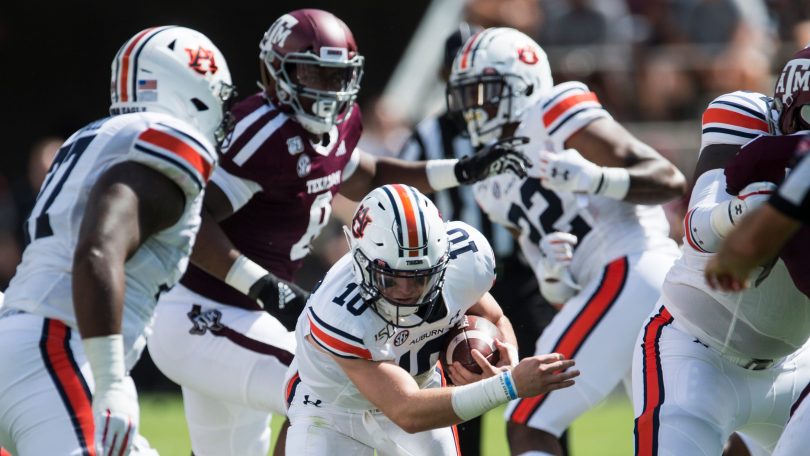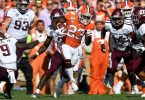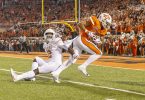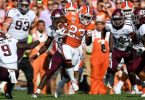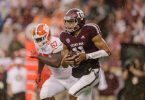Snap judgments are silly. Knee-jerk reactions are nonsense. Both, however, fit perfectly in football – at all levels. The games are few and, hence, more important. The typical week between games allows for overdone analysis and predictions.
That’s what we’re left with following Texas A&M’s second loss of the season. The Aggies, ranked 17th in The Associated Press poll, failed to defend their home field Saturday as No. 8 Auburn continued to establish itself as a force in the SEC West division with a 28-20 victory.
A&M dangerously close to claiming the national championship for, "But guys, we had some really competitive, quality losses."
— Andrew Gilman (@AndrewGilmanOK) September 21, 2019
It was the first home loss for second-year Aggies coach Jimbo Fisher and the second loss this season to a team ranked in the top 10. Two weeks ago, at top-ranked and defending national champion Clemson, A&M never threatened. Against Auburn, the Aggies trailed 21-3 early in the second half and the 18-point deficit was far too large for an offense that hasn’t been competitive against Power Five foes.
Fisher is 23-17 against Power Five teams since Jameis Winston ended his career at Florida State. Twitter was ablaze with the peanut gallery sniping at the Aggies and their $75 million coach.
Following last season’s 9-4 season capped by a four-game winning streak, there was huge optimism in College Station. Junior quarterback Kellen Mond claimed he was the best quarterback in the SEC. A stellar recruiting class was expected to infuse the roster with talent.
But after losing the conference opener and with three games remaining against top 10 teams (Alabama, Georgia and LSU), Texas A&M is facing huge hurdles.
“We didn’t play as well as we wanted to, said Fisher, whose team faces Arkansas next Saturday at AT&T Stadium in Arlington. “We competed in the game. We had some opportunities on offense, on defense, and in special teams to make some plays. And we just were three, four, five plays short. That’s what it comes down to when you play really good teams.”
Perhaps most frustrating for Gig ‘Em fans was the way the Aggies lost. The running game was non-productive and Mond was forced to throw too much. He completed 31 of 49 for 335 yards and two touchdowns. But in dietary terms, those numbers were empty calories.
Jimbo the offensive guru has barely made a dent in this Auburn D. Coach Steele has him bottled up. At least they sell beer at Kyle Field now.
— Matt Mosley (@mattmosley) September 21, 2019
A major problem was the lack of production on first down. The Aggies had 33 first-down plays, of which 10 were runs. Those plays gained 32 yards. Mond gained 17 and 16 yards on first down runs. On the 23 passes on first down, Mond completed 8-of-18.
That resulted in too many third-and-longs, which allowed Auburn’s defense to pressure Mond with a consistent rush. A&M was 5-of-14 on third downs; those 14 plays averaged nine yards in length.
“We got to get to running the ball better,” Fisher said. “We got to get the running game going, that’s for sure. We didn’t get that going.”
The Aggies are averaging 144 yards per game, but in their two losses they’re averaging just 54.5 yards per game on the ground.
A&M’s running backs – Jacob Kibodi and Isaiah Spiller — combined for 12 carries and 30 yards. Ironically, the best run by an Aggie back was Spiller’s 13-yard carry on the first play of the second half. That play ended in a fumble recovered by Auburn that set up a six-play, 38-yard touchdown drive for a 21-3 lead.
“That was (our) one turnover in the game,” Fisher said. “We had a big run and that changed the momentum of the game back in what we did right there.”
The first play after Spiller’s fumble, A&M started on its own 35 thanks to Auburn’s kickoff going out of bounds. Mond was sacked and fumbled. The Aggies avoided another disaster by recovering. The next play, Mond was sacked, forcing a third and 20, which became third and 25 when the Aggies were flagged for . . . delay of game. (Really.) Then came a false start. Third and 30. (Really, really.)
“Jimbo needs to stay patient here but clearly they have to have other options than just standing six, seven yards deep in the pocket,” CBS analyst Rick Neuheisel said during the telecast. “This (Auburn) front is formidable.”
Neuheisel questioned why the Aggies didn’t call more running plays for Mond. Mond was sacked three times and on his six carries he gained 26 carries.
The bottom line: A&M’s offensive line, which returned players who had started 69 games, hasn’t performed well. First-year offensive line coach Jim Henson, who replaced Jim Turner, has yet to build a cohesive unit.
Auburn coach Gus Malzahn, who has gone back to calling plays this season, outcoached Fisher and A&M defensive coordinator Mike Elko. Malzahn rationed his play calls to take the pressure off freshman quarterback Bo Nix, who was playing in his first road game.
“They did a couple of things we haven’t seen,” Fisher said of Auburn’s game plan.
The Tigers went up 7-0 on their first possession when sophomore Anthony Schwartz sprinted through the Aggies’ defense for a 57-yard score. Auburn went 46 yards in six plays for its second TD. Malzahn called on backup QB Joey Gatewood, considered more of a runner than a passer. He found tight end John Samuel Shenker for a 6-yard TD. Shenker lined up as a “back-side” tight end with the Auburn line loaded to the opposite side and he was wide open in the end zone.
Mond understands that thus far the Aggies have had to play uphill in their two Big Games.
“Since last year one of the biggest things we’ve needed to focus on is getting started early,” he said. “Whether it’s the run game or the pass game, putting points up early and putting pressure on the opposing team is something we need to do. We need to make the other team play from behind and have to drive 80 or 90 yards against our defense.”
Before the season, was the Aggies’ offense overrated despite losing its top rusher and top receiver? Was Mond expected to do too much? Are Florida State fans – any of those that might be paying attention – saying, “Hey, we told you so” because they had seen Fisher’s offensive play calling go stale during his final seasons in Tallahassee?
— Brandon Marcello (@bmarcello) September 21, 2019
Loyal Aggies fans, part of 101,681 at Kyle Field, were filing out after Auburn scored to go up 28-10 with 8:27 remaining.

